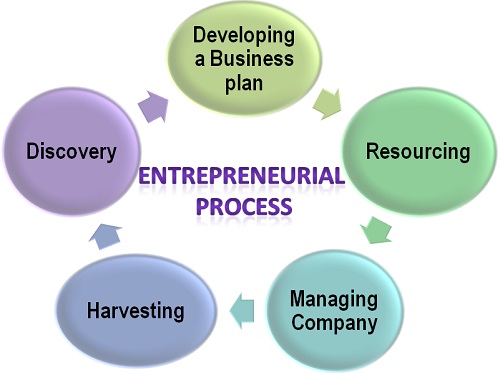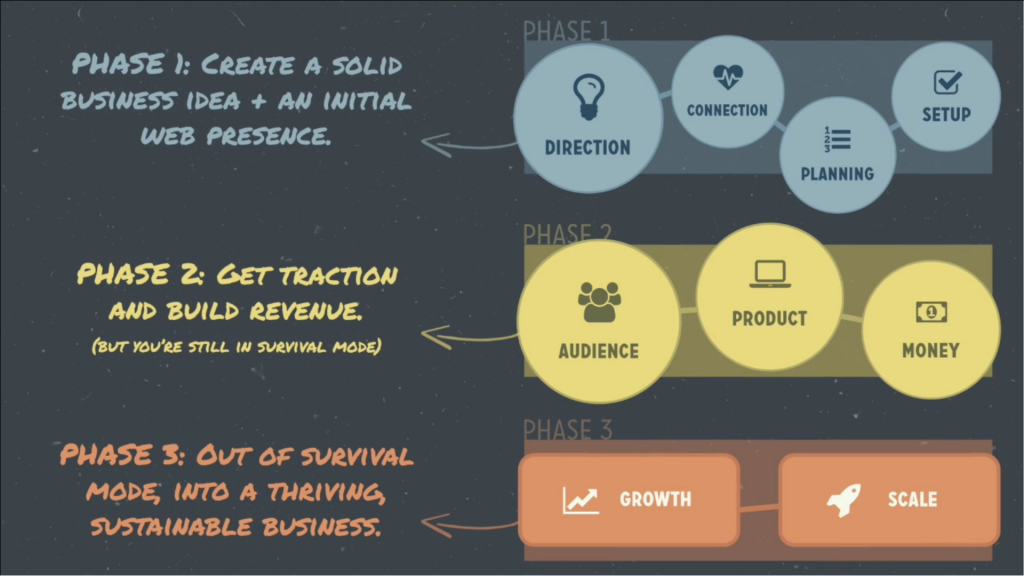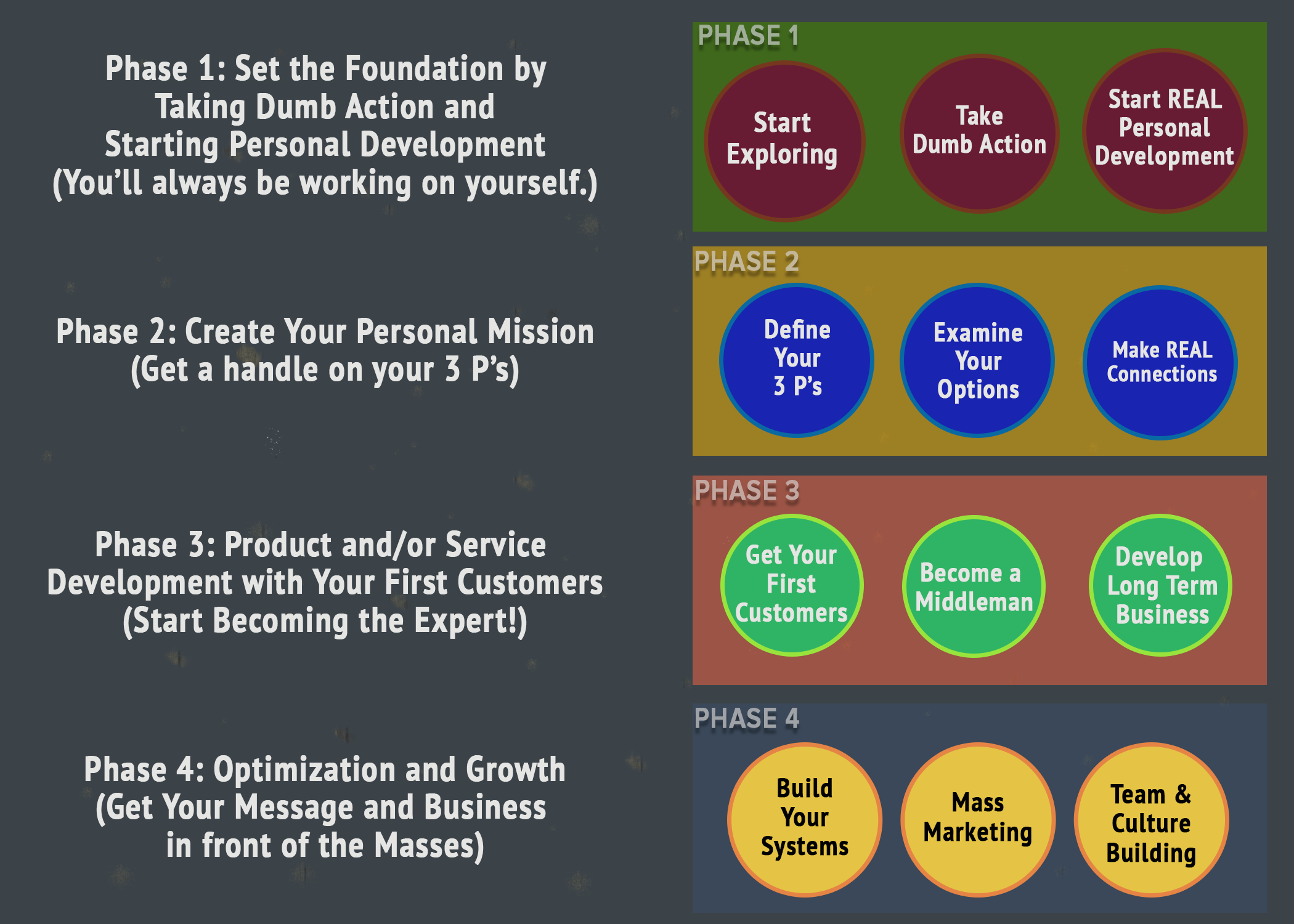4 Phases of the Mission Driven Entrepreneurial Process
When I restarted my own entrepreneurial process 3 years ago, I used Fizzle to help me design a roadmap of what I wanted New Inceptions to be.
Since then, I’ve realized that I was trying to build something that I couldn’t by myself. So, last summer, I started really putting an emphasis on meeting the right kinds of people to help things go bigger faster.
That’s about the time that I started doing more things locally and getting started with Amplify and C317.
Well, fast forward to today, and I have to say, there’s a lot of things I’ve learned along the way. And one of those things is that when you’re talking about scaling a business where you’re making a huge impact, you’re talking about a business that has gone through several stages to get where they’re at.
In this post, I want to share what those phases are so you have an idea of where you’re at.
Definition of the Entrepreneurial Process
Traditional Process
So there’s several entrepreneurial processes out there. One is the model that a lot of people know from academia or other traditional sources. It looks a little like this:
I’m not saying that this isn’t correct, but it’s not very functional. It “might” be functional if you’re in the tech entrepreneur space. But in reality, most entrepreneurs don’t focus on these topics today – especially not “Developing a business plan”!
Fizzle’s Three Phases
When I was in Fizzle, they had their own entrepreneurial process. It looks like this:
This is a much more practical model. And when you listen to Corbett, Chase, and Steph on their podcast, it does make a lot of sense in why they made it this way.
However, as I’ve been going back into studying other entrepreneurs out there, there seems to be an alternative path to the one above (which, I think is a great plan otherwise I wouldn’t be a proponent of theirs!).
This 4 phase path is one I wanted to share with you guys
The New Inceptions Roadmap
So, New Inceptions – what does that mean? When I first came up with it, I had recently seen the movie Inception. In the movie, we see this world where dreams happen in dreams. And if you’ve heard the podcast or talked to me in person, you might have heard that I feel that my job in life is to pull people out of mental prisons. Whether or not they put themselves there OR they’ve allowed others to put them there, they’re stuck.
So my 4 phase process includes one phase in where the focus is simply getting “unstuck”. I believe that this is is the most foundational phase and I see a lot of entrepreneurs skipping right over it as well as the next one. They start in phase 3, eventually find that they don’t like the work they’re doing or they’re simply not happy, and then have to start something again.
Our goal here is to prevent that from happening to you!
So, just to lay them out – here are the four stages:
- Phase 1 – Set the Foundation
- Phase 2 – Personal Mission Development
- Phase 3 – Product and Service Development with First Customers (Start Becoming the Expert!)
- Phase 4 – Optimization and Growth
Let’s take a little more of a look at them:
The 4 Phases of the Mission Driven Entrepreneurial Process
Phase 1: Set the Foundation
You guys know that I’m also a huge fan of Dane Maxwell and Andy Drish’s The Foundation.
When I heard about it back in 2012, it blew me away. Up until that point, I had only really heard of the first process I presented here.
One of the things that The Foundation does a great deal of work in is helping people with their limiting beliefs.
It’s these same limiting beliefs that keep people stuck in their mental prisons.
So in this phase, a new entrepreneur should be essentially taking dumb action. Just getting a feel for what’s out there. What sounds interesting to them? What do they feel like they gravitate towards?
Another thing we need to look at is how do we communicate with ourselves and the world around us. Are we real when need to be with ourselves and others? If not, why not? Do we lump all people into one group or are we aware of the different personalities that are out there?
Also in this phase, we need to focus on moving a external locus of control to one that is a bit more internal.
This is all important stuff that needs to be thought about before we can dive into the next phase.
Phase 2: Create Your Personal Mission
In this phase, we’ll be looking at crafting your own personal mission.
This is a vital phase that many entrepreneurs skip over. However, time and time again, I’ve heard those from the top say they would have gotten to the top faster had they taken the time to understand what their work actually meant.
In particular, in this phase we’re looking at discovering our Passions, Purpose, and preferred Process (the 3 P’s) and how that relates to our overall mission. We’ll also be looking at all the options you could put your unique skill set towards.
And we also want to make sure we’re starting to develop our network. But we have to make sure we’re doing it strategically. There’s some key people that we need to be meeting if we want to do extraordinary things. We have to seek those folks out who have been there before.
Phase 3: Product and Service Development with First Customers (Start Becoming the Expert!)
Now that we’ve developed a understanding of who we are and the skills that we can bring to the market, it’s time that we actually see if someone would be willing to pay for what we can help them with.
Here’s the thing, though. It’s not about what we THINK we can help them with. It’s about what we KNOW we can help them with. And the only way to find out what we can help them with is by actually ASKING them.
Once you know what they want – how are you going to bring it to them? Are you going to get external funding or are you going to do a presale (hint: if you’re smart, you’ll do a presale before you ever lift a finger creating a service, course, SaaS, or even a physical product).
There’s a lot of moving parts in this phase. However, if you do them in the right sequence, it can be super fun.
Phase 4: Optimization and Growth
Once you have your first handful of customers, you’ll need to start thinking about your systems. No business became an empire without having a set way of doing things. The more automated you can make things, the more you can leverage your time… and your TEAM’s time.
So, yes. This is the stage where we start thinking about hiring people to help.
Also, if you haven’t made a website yet, then you’ll want to do that in this phase. Because when you’re marketing to the masses (regardless of how you do it), you have to give them something to go to that’s not controlled by third parties.
Action Steps
So, this is a lot to throw at you. And really, it depends on where you’re at in your journey. I’ve known people who were in phase 4 and ended up having to go back to phase 2 to recreate their career. In fact, the last two books I read were all about that – people who were at the “top of the world” came crashing down only to build a less stressful and much more enjoyable life.
So where are you at in your journey? Let me know where you’re starting from and I’ll help you get to the next level.











